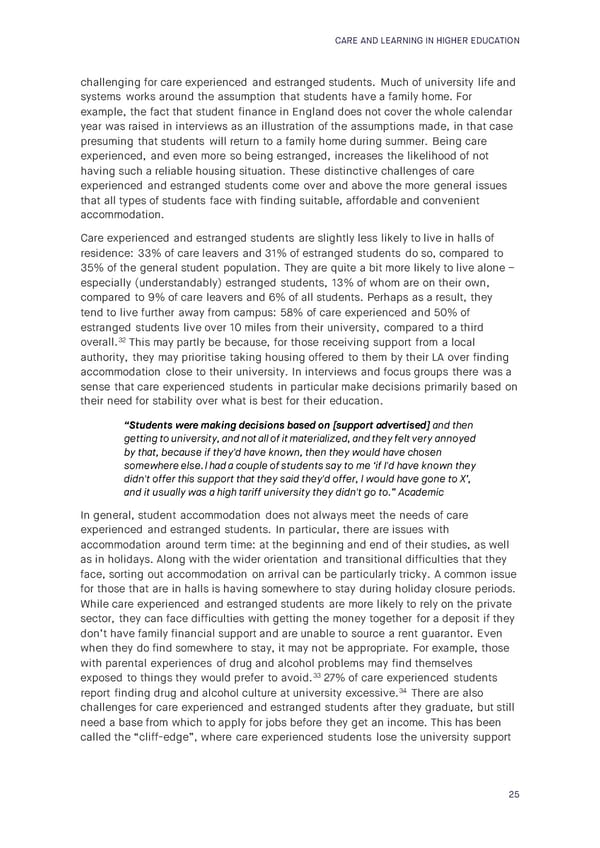CARE AND LEARNING IN HIGHER EDUCATION challenging for care experienced and estranged students. Much of university life and systems works around the assumption that students have a family home. For example, the fact that student finance in England does not cover the whole calendar year was raised in interviews as an illustration of the assumptions made, in that case presuming that students will return to a family home during summer. Being care experienced, and even more so being estranged, increases the likelihood of not having such a reliable housing situation. These distinctive challenges of care experienced and estranged students come over and above the more general issues that all types of students face with finding suitable, affordable and convenient accommodation. Care experienced and estranged students are slightly less likely to live in halls of residence: 33% of care leavers and 31% of estranged students do so, compared to 35% of the general student population. They are quite a bit more likely to live alone – especially (understandably) estranged students, 13% of whom are on their own, compared to 9% of care leavers and 6% of all students. Perhaps as a result, they tend to live further away from campus: 58% of care experienced and 50% of estranged students live over 10 miles from their university, compared to a third overall.32 This may partly be because, for those receiving support from a local authority, they may prioritise taking housing offered to them by their LA over finding accommodation close to their university. In interviews and focus groups there was a sense that care experienced students in particular make decisions primarily based on their need for stability over what is best for their education. “Students were making decisions based on [support advertised] and then getting to university, and not all of it materialized, and they felt very annoyed by that, because if they'd have known, then they would have chosen somewhere else. I had a couple of students say to me ‘if I'd have known they didn't offer this support that they said they'd offer, I would have gone to X’, and it usually was a high tariff university they didn't go to.” Academic In general, student accommodation does not always meet the needs of care experienced and estranged students. In particular, there are issues with accommodation around term time: at the beginning and end of their studies, as well as in holidays. Along with the wider orientation and transitional difficulties that they face, sorting out accommodation on arrival can be particularly tricky. A common issue for those that are in halls is having somewhere to stay during holiday closure periods. While care experienced and estranged students are more likely to rely on the private sector, they can face difficulties with getting the money together for a deposit if they don’t have family financial support and are unable to source a rent guarantor. Even when they do find somewhere to stay, it may not be appropriate. For example, those with parental experiences of drug and alcohol problems may find themselves exposed to things they would prefer to avoid.33 27% of care experienced students report finding drug and alcohol culture at university excessive.34 There are also challenges for care experienced and estranged students after they graduate, but still need a base from which to apply for jobs before they get an income. This has been called the “cliff-edge”, where care experienced students lose the university support 25
 Care and Learning in Higher Education Page 25 Page 27
Care and Learning in Higher Education Page 25 Page 27